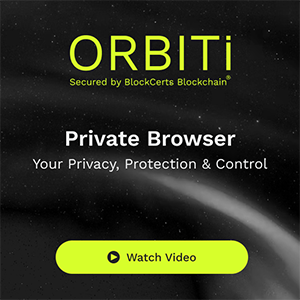Why Your Little Ape Gets Stolen?
By Melissa Lowry, Social Media Manager, BlockCerts Blockchain

Picture this: you just bought your first NFT- a cute little ape wearing red aviator sunglasses– the newest rage in the NFT community. You are so excited, albeit slightly offended, by the transaction fees you had to pay, but hopeful its value will increase in the next few months (so you can sell it for a hefty profit).
However, a few days later…you see a headline while scrolling Twitter that catches your eye: “Hackers take millions of NFTs on OpenSea” …
…You panic a tiny bit, furiously log in to check on your wallet, and are devastated to see that you are one of the millions whose purchases have disappeared. Not only did you lose your adorable ape; you also lost the pretty significant chunk of change you spent on your transaction fees. Eventually, you do get your money back for your NFT but you’re still left with a bad taste in your mouth from your first “centralized platform” experience.
How did this happen? Isn’t your NFT stored on the blockchain? Isn’t this supposed to be the “most secure way” to do business in 2022? Yes, technically it is supposed to be. But the problem here lies within the centralized platform you purchased your NFT on, not the blockchain.
What’s Wrong with Centralized Platforms?
Centralized platforms have been around for 40 years. The internet or World Wide Web was announced for public use on August 6th, 1991, 31+ years ago. This Web 2.0 world changed business and changed life. Now transactions could be placed on “the web” and products sold on the web. What was good then, 30 to 40 years ago is more than outdated.
Centralized platforms store their data in one or a few locations. Even with security systems to try and protect that data, these repositories are like a target for hackers and year-after-year, they have been proving that another solution is in critical need.
In 2020 over 30 billion data records where exposed, and over 3,950 major companies had a data breach, due to centralized data. Companies like Verizon, American Airlines, Zoom, Twitter, Facebook, Microsoft, MGM, General Electric, J-Crew, GoDaddy, and a long list of companies exposed your data (see report from Identity Force). 2020 was 295% higher than 2019 and every week there is a new hack or data breach in the news.
So, how does it make you feel, knowing that over 95% of NFT transactions occur on a centralized platform, processing over $228 billion USD a month! Almost all platforms accept” fiat”, standard currency like USD, so anyone can purchase, making them extremely accessible for new buyers to begin trading.
Third Parties – High Transaction Fees
These platforms are the third party, acting as an escrow, or mitigator between the purchaser and the buyer. Similar to when you purchase a house, the realtor, or in this case, the exchange, takes a percentage of your transaction to cover their fees and make a profit. For OpenSea, in particular, their transaction fees vary depending on the value of Ethereum, which they use to power their platform. This can mean that your transaction fee, or “gas” fee, is maybe $22, or it could mean you’re paying an additional $165 in fees on a $200 NFT, ouch!
As the value of Ethereum has steadily increased in the last few years, the fees for these platforms have also increased, causing a ripple effect. NFT prices must go higher to cover the creator’s gas fees, and the buyers have more fees attached to their NFT purchase. But when that is the only option to be able to sell or purchase an NFT, what are you supposed to do?
In addition, when you purchase your NFT from a centralized platform, like OpenSea, your transactions are stored off the blockchain. Identity theft and fraud are an increasing risk as you most likely have to provide proof of ID, banking information, home address, and more. Despite CEOs repeatedly stating their platforms are secure and your purchases are safe, thousands of people have found themselves on the wrong end of a cyber-attack losing their wallets, NFTs, and crypto.
Recently, OpenSea had thirty-two NFTs stolen by a hacker, valued at over $1.7 million USD dollars. While thirty-two may not seem like many on an exchange that hosts millions of transactions; in October of 2021, OpenSea also had a vulnerability noticed when crypto wallets were stolen while hackers airdropped fake NFTs. These types of threats are becoming alarmingly more common, as transactions become more digital.
Unfortunately, 95% of transactions occur on centralized platforms, these risks have had to be tolerated in order to participate in the ever-growing NFT craze.
SO HOW DO WE FIX THIS?
Is there a solution for these obvious flaws in centralized platforms? Ideally, you need a platform that securely stores your information and wallet on the blockchain, your purchases and identity remain anonymous with no threat of identity theft, and you do not have to pay any gas fees when creating or purchasing an NFT. A simple Google search would tell you that no platform can check all three of those boxes, AND also accept fiat currency until now. Introducing NFTCERTin, powered by BlockCerts. NFTCERTin combines the power and security of a decentralized platform, with the ease and functionality of a centralized one, throwing in the added bonus of no gas fees.
It’s the first “Authenticated Block Blockchain”. What that means is that the buyer and seller are “authenticated” through the simple process. This eliminates the first point of fraudulent NFTs. With Multi-factor Authentication and Private Key access, there is another barrier to entry, and by minting the NFT on this platform, the NFT stays safely protected in the BCERTin vault, and stored on the blockchain.
NFTCERTin takes the best aspects of both types of platforms and creates a blockchain powerhouse that provides a Web 3.0 solution to the issues that plague the 31-year-old Web 2.0 world.
NFTCERTin allows you to buy your cute ape NFT for less, and rest assured that your little ape is safe in its home and it can’t be taken away from you.
Find out more at www.nftcertin.com






